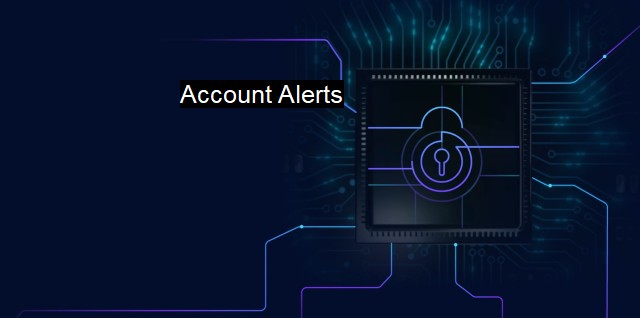What are Account Alerts?
Securing Personal Data with Account Alerts: A Vital Component in Cybersecurity
Account Alerts in the context of cybersecurity and antivirus programs play a vital role as these are proactive steps built to identify and neutralize threats before they escalate to major problems that could disrupt or compromise the security of a business or personal data. these alerts serve more than just notifications; they are call-to-action signals designed to ensure there are operative cybersecurity actions to protect every activity's safety in bounded online business environments."Account Alerts" specifically work by monitoring the user's accounts activity and notifying them on predefined conditions or unspecified irregularities. it may indicate excessive failed login attempts, indicate unknown login activity or report transactions beyond the preset threshold in finance-oriented applications. These scenarios indicate possible loopholes exploited by unauthorized users and give raise to the alarm. At all levels, Account Alerts functionality fosters a culture that makes data integrity, data privacy, and cybersecurity a high-priority occurrence.
While the functionality of these alerts from cyber security tools or services can vary greatly they are designed to detect and identify any suspicious behavior that signifies potential attack or breach. An alert could flag activities such as attempts to access sensitive data, unusual patterns of usage, or attempts at unauthorized changes to key configurations of the security systems.
In an antivirus context, Account Alerts can be extremely beneficial in increasing a system's level of ongoing protection. These procedural alerts inform users about changes in the system settings that necessitates a realistic antivirus response. That evidently configures antivirus software to scrutinize one's system circularly, monitoring, investigating, detecting, and alerting timely. In real-time, dives benign control in users' arm that maintain a strong defense line against harmful Trojan viruses, phishing spam mails, worm files, spyware apps, and beneficially boosting robust bathware blocks that efficiently sustains operative actionsSec.
Beyond individual users, Account Alerts has paramount importance in a corporate setting. Here, it creates capacities of continually monitoring activities and anomalies across numerous interconnected accounts and networks. Cybersecurity vendors thus often offer highly sophisticated Account Alert options intertwining cybersecurity, artificial intelligence, and big data analytics techniques to predict potential cyber threats.
Importantly, receiving an Account Alert is only half of the needed safety measure, responding to these alerts promptly and decisively makes a big difference, In many cases, this may necessitate simply updating software or changing passwords, steps well articulated when designed Account Alerts. On a larger organizational level, this may imply contacting the IT department immediately or attaining personalized help from the cybersecurity vendor.
Account Alerts can foster cybersecurity education and development, rendering complex notions invoke in simple concise defined actions of prevention. For normal users to IT specialists, consistent interactions with Account Alerts invite them into progressive understanding and innovation response levels against the ever-evolving cybersecurity landscape.
Cyber threat mix varies every day. With each enumerated day globally, We are fighting legacy threats in hybrid conjunction with redesigned unauthorized aggression levels. Hence, keeping existing system securities notified through such changes is integral prevention phenomenon invoke that ‘Account Alerts’ streamlines and fosters.
Striking a balance in Account Alert usage is critical since too many alerts could risk becoming an annoyance to users or "alert fatigue," whereas too few may miss out on crucial haptics‘ breaches indications.
Account Alerts form a guiding cornerstone in the realm of cybersecurity and antivirus defenses. They analyze, notify, and caution users―whether individuals or large organizations―about potential cyber threats in their navigation workflows. Consequently, they not only protect but also educate and empower users. The adoption of periodical reactive cybersecurity posture couples wisely with the culture wrong Account Alerts have in their defensive play applications to prevent such threats and web vulnerabilities shall resonate with a progressive smarter proactive vaccination of our digital citizenry uno the coming days.

Account Alerts FAQs
What are account alerts?
Account alerts are notifications that inform you of any suspicious activity related to your online account, such as login attempts, password changes, or any other unauthorized access.Why are account alerts important for cybersecurity?
Account alerts are crucial for cybersecurity as they help prevent potential security breaches and unauthorized access to your personal data. They can also alert you to potential phishing attempts and enable you to take swift action to secure your accounts.How do I set up account alerts?
The process of setting up account alerts typically varies based on the service you are using. However, most online services offer the option to turn on account alerts in their account settings or security settings.What should I do if I receive an account alert?
If you receive an account alert, it is essential to take immediate action to secure your account. This might involve changing your password, reviewing your account activity, or contacting the service provider to report any suspicious activity. Always follow the instructions provided by the alert message, and consider enabling two-factor authentication for added security.| | A | | | B | | | C | | | D | | | E | | | F | | | G | | | H | | | I | | | J | | | K | | | L | | | M | |
| | N | | | O | | | P | | | Q | | | R | | | S | | | T | | | U | | | V | | | W | | | X | | | Y | | | Z | |
| | 1 | | | 2 | | | 3 | | | 4 | | | 7 | | | 8 | | |||||||